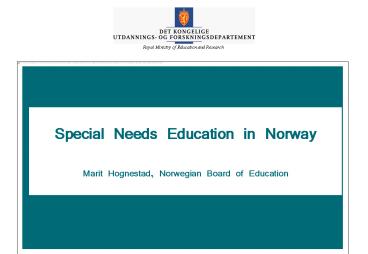Ingen lysbildetittel - PowerPoint PPT Presentation
1 / 12
Title:
Ingen lysbildetittel
Description:
All pupils were granted the right to suitable and adapted ... possibilities, resources. and empowerment. attitudes, skills, methods, general pedagogics ... – PowerPoint PPT presentation
Number of Views:33
Avg rating:3.0/5.0
Title: Ingen lysbildetittel
1
Royal Ministry of Education and Research
Special Needs Education in Norway Marit
Hognestad, Norwegian Board of Education
Special Needs Education in Norway
2
The Norwegian school system
- 1976 One Education Act for all pupils
- All pupils were granted the right to suitable and
adapted education in their local school but
gradually! The process took 20 years. - 1n 1996, 99.5 percent of the pupils were included
in local schools - Special education for pupils who are in need of
it - Statutory right based on expert Statement (6
percent)
3
Curriculum
- All children with a right to SNE also have the
right to an individual educational plan. - Normally this plan is a mix of an individually
adapted curriculum and the general curriculum for
the class. - Progress and content is evaluated every 6 months.
4
Integration or inclusion?
- Do the included children REALLY get suitable
education? - Do they really FEEL included?
- Integration is mostly related to resources,
equipment and and physical structures. - Inclusion is mostly related to values, attitudes
and culture.
5
The Educational-Psycological Service
- Every municipality must have an Educational-
Psycological Service, and are responsible for
running the service - The Educational and Psychological Service is an
advisory body. - About 285 offices throughout the country
- 2100 professionals
- psycologists (320), social workers (120),
teachers in special education (750),educational
psychologic advisers (600), others (300)
6
The Educational-Psycological Service
- The functions of the Educational-Psycological
Service are - to advice schools, teachers, parents and pupils
directly and to follow up - to give expert statements as a basis for
Statutory right decision (which releases the
funding) - to monitor and evaluate the situation for pupils
with special needs in school
7
Tasks for the educational- psycological service
- Learning problems
- - Social and emotional problems (anxiety,
- restlessness, depression, family-related
problems) - Behavioural problems, bad manners, violence,
- aggression
- Spoken language problems
- Physical challenges
8
Norwegian Support System for Special Education
- The municipalities/counties does not have the
necessary competence regarding the needs of so
called low incidence groups. - In the early 90ies, the remains of the old system
of special schools was finally removed. Most
schools were closed, and some were chanced to
National Resource Centres. - This national support system is meant to assure
the quality of the education by offering
counselling and support to schools and the local
educational-psychological service.
9
Transfer of resources
- In the late 90ies, there was lack of staff in the
Educational-Psychological Service. - The Parliament decided to strengthen the service
at local level through the transfer of resources
and expertise from some national resource centres
for special needs education to the local level
service. - 300 new staff members. 20 increase. (But 434
municipalities)
10
Capacity building programme
- A three-year practice-oriented capacity building
programme has been running 2000 - 2002. - Objective of the programme To improve the
competence of the service in areas where the
local communities and teachers need most support
- social and emotional problems
- reading and writing difficulties
- multiple learning difficulties
11
Alternative schools - alternative school units
- The main efforts to fight behavioural problems
take place within each class and school. - These challenges have high priority and different
initiatives are taken to improve teachers skill. - (programs, seminars, material)
- Still some school owners, specially in large
cities, have organised so called "alternative
schools" or "alternative school units", more or
less closely connected to the local school.
12
Future challenges
- Less focus on
- special education
- diagnosis, categories of
- disability, difficulties
- Organisation, economics
- prosedure
- More focus on
- adapted and inclusive
- education for all pupils
- possibilities, resources
- and empowerment
- attitudes, skills, methods,
- general pedagogics































